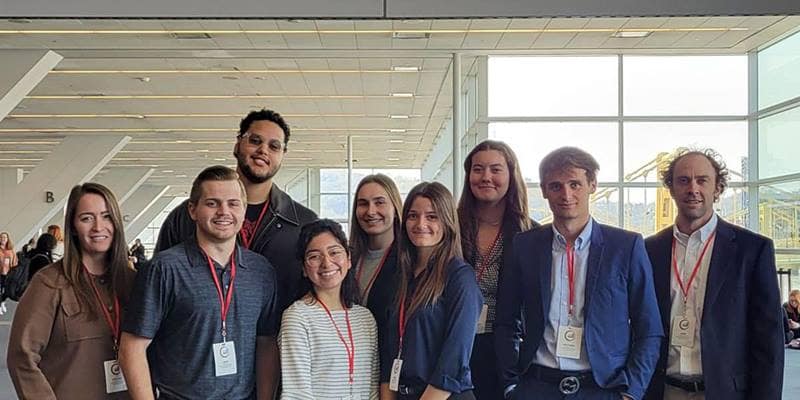Embry‑Riddle Advantage
At the core of applied science and math is research. Weather patterns, human behavior, technology, aerospace — whatever your focus, there’s a research component that contributes to the advancement of civilization.
For the ever-inquisitive minds, analytical thinkers, and problem solvers, Embry‑Riddle offers applied research degree programs to challenge and excite. These are deeply rooted in research, and while some areas may be focused on aviation and aerospace, the fundamentals can be applied to any other industry.
For instance, you could study Applied Meteorology and go into a career with the U.S. Air Force or become a broadcast meteorologist.
Either way, you’ll be exposed to high-level research using high-tech labs and emerge with a highly regarded education.

Throughout your studies, you’ll have the chance to work on group projects and research alongside fellow students and accomplished faculty. There are even networking opportunities that involve meeting fellow students from other schools who may be researching the same subject matter as you.
You can also take advantage of many clubs and organizations related to your degree program to enhance your experience and add to your résumé.
Faculty members are well connected in the industry, and our students gain connections through faculty.
Degrees & Programs
Are you already working, do you want to start a new job, or are you aiming toward your first professional experience? Embry‑Riddle has degree programs suited to all research-driven students.
You could earn your Bachelor of Science in whichever applied research field best suits you. There’s even an accelerated combination where you earn the Bachelor of Science in Human Factors Psychology and the Master of Science in Human Factors in five years. Whether you want to learn about weather patterns, mathematical formulas and applications, behavior, or the way humans interact with technology, there is a degree program that will place you in a gratifying career.
Discover our offerings to determine which program piques your interest.
Bachelor’s
- Aerospace Physiology
- Air Traffic Management
- Applied Biology
- Applied Meteorology
- Astronomy
- Astronomy and Astrophysics
- Aviation and Aerospace Safety
- Communication
- Computational Mathematics
- Computer Science
- Data Science
- Engineering Physics
- Forensic Accounting and Fraud Examination
- Forensic Biology
- Forensic Psychology
- Human Factors Psychology
- Industrial/Organizational Psychology
- Interdisciplinary Studies
- Meteorology
- Simulation Science, Games and Animation
- Space Operations
- Space Physics
Master’s
Professional Education
Review our non-credit continuing education offerings at proed.erau.edu.
Career Outlook
Students from applied research disciplines often work for distinguished companies, such as The Boeing Company, NASA, NavSea, General Motors, Gulfstream, and Lockheed Martin. Your education and career goals will be your guide, but you can also expect to find an abundance of challenging and rewarding opportunities to encourage your learning.
With a Human Factors degree, you could help improve the way astronauts live and work on the International Space Station. A Computational Mathematics degree can prepare you to work in prototype development or predictive modeling. An Applied Meteorology degree could pave the way toward a career in weather consulting.
Your salary potential varies depending on what you study. The average salary for an experienced federal atmospheric scientist approaches $100,000 annually.
In a 2022 survey of U.X. Professionals, those with a bachelor’s degree report earning nearly $50,000 more than those with a high school diploma or GED.
Source: UXPA International Salary Survey
Research
Our faculty and students are actively involved in research using applied sciences. Read about how they’re positively impacting industry in some recent projects below.
Learning Environments
There is no better place to study applied research than a highly technological university that houses state-of-the-art facilities and modern labs.

Daytona Beach, FL Campus
- From the largest university-based telescope in the state of Florida to the Department of Mathematics’ Nonlinear Wave Lab, students in the areas of Applied Sciences at the Daytona Beach Campus have access to some of the most advanced labs and facilities, each focused on providing research and hands-on experiences.
- Human Factors students explore how games and simulation can enhance education and training in the Game-Based Education and Advanced Research Studies (GEARS) Lab, which is one of eight labs dedicated to study of Human Factors.
- In the Weather Center, students employ tools to better understand and forecast severe climatological phenomena such as thunderstorms and tornadoes.
- The Air Traffic Management program offers training using the Control Tower, Terminal Radar, and En-route Labs.
- Physical Sciences students access the Atmospheric Physics Research Lab to support their classroom learning.

Prescott, AZ Campus
- The Prescott Campus offers many state-of-the-art facilities for those interested in Applied Sciences. Students learn cutting-edge forensic biology in two brand-new laboratories where activities include tissue sampling and analysis of DNA evidence.
- Meteorology students have access to real-time digital meteorological displays and printed weather maps for forecasting and weather briefings.
- The Air Traffic Control Lab is the only one of its kind at the collegiate level, linking with the Airway Science Lab to create our unique Embry‑Riddle Virtual Airspace.
- Astronomy students use the Campus Observatory Complex with its impressive astronomical observing conditions due to Prescott’s high altitude and its location away from major cities.
- Industrial Psychology and Safety students gain hands-on experience in the Robertson Aircraft Accident Investigation Lab and learn how to analyze and interpret movements in physiology using the Vicon motion measurement system in the Ergonomics Lab.

Worldwide Campus
- Embry‑Riddle Worldwide delivers a quality academic experience by expert faculty educators with hands-on industry experience in our three academic colleges and Online Campus. Flexible scheduling and locations close to home are specifically suited for busy working professionals, active-duty military and veterans, and students with families.
- EagleVision, a virtual classroom, combines the power of web video conferencing and learning management system software to maximize the benefits of synchronous and asynchronous virtual learning environments.









